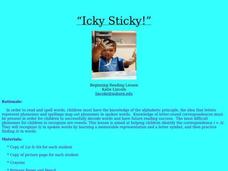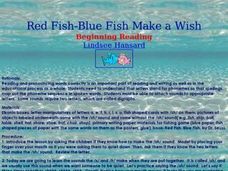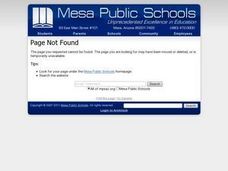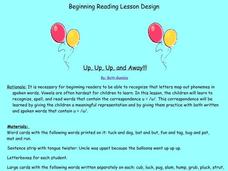Curated OER
Putt-Putt Old Car
Young scholars study the phoneme /p/ both in written and spoken language while differentiating from the phoneme /b/. They think about the "put, put" sound that an old car makes, and work with at tongue twister. Next, they write the...
Curated OER
"HiSS"terical Snakes
Students explore the /s/ sound on the end of words. They discuss the phoneme /s/. Students listen for /s/=s at the beginning, middle and end of words. They write the letter s and practice reading and writing words containing /s/.
Curated OER
The Crying Baby
Pupils practice recognizing phonemes with letters emphasizing the /a/ in spoken words and by letter symbols. They interact with Elkonin boxes, letter manipulatives, the book, "A Cat Nap," and a poster with a tongue twister on it.
Curated OER
The B Beat
Students recognize letter b in print and respective phoneme /b/ in spoken words, such as tongue twisters. Students then listen for phoneme in spoken words, and practice writing letter b.
Curated OER
Say What?
Students explore phonemes in spoken words. They discuss the /e/ (short e) correspondence. Students read "Red Gets Fed." They learn a meaningful letter symbol for the /e/. Students identify /e/ sound in both spoken and written words.
Curated OER
"The Scary Letter...aaaaaaaaaa!!!"
Pupils study the /a/ using the hand gesture and 'aaa' sound as if they were seeing a ghost. Next, they recite a tongue twister and make words using letter boxes using different numbers of phonemes. Next, they read "Pat's Jam" out loud to...
Curated OER
Icky Sticky
Students recognize the short vowel i in written and spoken language. Through matching and listening activities, they discriminate the vowel sound /i/ from other phonemes. Students identify the phoneme and letter in words and pictures.
Curated OER
Red Fish-Blue Fish Make a Wish
Students to read and pronounce words correctly. They investigate the letters that stand for phonemes so that spellings map out the phoneme sequence in spoken words. Students attach sounds to appropriate letters. They have some sounds...
Curated OER
The Beautiful Bouncing Ball
Students practice recognizing a letter and its phoneme by utilizing the alphabetic principle while working with and identifying the sounds of /b/. They assess a big book, objects in the room, a timer and the tongue twister, "Billy...
Curated OER
/o/... I can't stop yawning!
Learners investigate the phoneme, a meaningful representation, and the letter symbol for /o/ (short o). This lesson helps students recognize the /o/ in spoken words and begin to spell words with the assistance of letter boxes. Learners...
Curated OER
Shiny Shells on the Shore
Students investigate how: A single phoneme, which is a vocal gesture in spoken words, can be represented by more than one grapheme. Also how a digraph is the combination of two letters that make one sound (there are both vowel and...
Curated OER
Open Wide and Say Ahh
Students recognize the short vowel o in written and spoken language. Through matching and listening activities, they discriminate the vowel sound /o/ from other phonemes. Students identify the phoneme and letter in words and pictures.
Curated OER
Yummy in My Tummy
Students explore phonemes in spoken words. They discuss the correspondence u=/u/. Students identify a meaningful representation for the phoneme and practice identifying /u/ in both written and spoken words. Students learn a tongue...
Curated OER
Abigail Ant
Students recognize the short vowel a in written and spoken language. Through matching and listening activities, they discriminate the vowel sound /a/ from other phonemes. Students identify the phoneme and letter in words and pictures.
Curated OER
Iggy and the Icky Sticky Inchworm
Students read and spell words. They have to recognize that letters stand for phonemes and spellings map out spoken words. Long and short vowels are hard to recognize and this lesson plan focuses on that. The short i is taught in the...
Curated OER
What's Up Doc?
Students demonstrate the /o/ sound by opening up their mouth and saying, "Ahhhhh". They try saying a tongue twister that contains the /o/ phoneme; repeating it two times together. They then practice writing the letter /o/ so that it can...
Curated OER
Elephants Enjoy Eating Eggs
Students recognize the short vowel e in written and spoken language. Through listening and matching activities, they discriminate the vowel sound /e/ from other phonemes. Students practice using the phoneme and letter in words by writing...
Curated OER
Baby Sally is Upset Again!
Learners, assessing how to read and write, join together grapheme's and the phonemes that make up words. They practice recognizing in oral and written form the vowel /a/. The book, "Matt and Rags," is introduced to the students in this...
Curated OER
The Squeaky Creaky Elevator
Students engage in an emergent literacy lesson in order to help develop the skills of letter recognition and corresponding sound of the phoneme. This is done with the use of a tongue twister using the phoneme of the letter "e".
Curated OER
U-u-under The U-u-umbrella!
Students practice using phonemes because they need to be able to recognize that phonemes and letters correspond with each other in order to become a proficient reader. The practice is done using the letter "u".
Curated OER
START Phonics Practice, Computer Style
First graders type words that match a given sound or phoneme on a computer.
Curated OER
Can You Open the Creaky Door?
Students recognize the short vowel e in written and spoken language. Through matching and listening activities, they discriminate the vowel sound /e/ from other phonemes. Students identify the phoneme and letter in words and pictures.
Curated OER
Don't Punch Too Hard
Young scholars recognize the short vowel u in written and spoken language. Through matching and listening activities, they discriminate the vowel sound /u/ from other phonemes. Students identify the phoneme and letter in words and pictures.
Curated OER
Up, Up and Away
Students recognize the short vowel u in written and spoken language. Through matching and listening activities, they discriminate the vowel sound /u/ from other phonemes. Students identify the phoneme and letter in words and pictures.

























